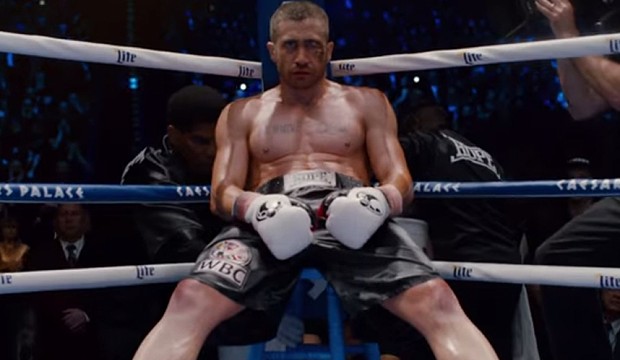Jake Gyllenhaal knows what a career-defining moment looks like – he’s had several.
Hitting the big-time at twenty with cult favourite Donnie Darko, this generation’s Dustin Hoffman has continued to refine his image across any number of hits (Brokeback Mountain, Zodiac), now scaling another career peak; completely unrecognisable as world lightweight boxing champion Billy Hope in Southpaw.
A very physical and brutally-vicious Gyllenhaal kicks off proceedings, defeating another boxer with nought-constrained rage to retain his title, supported by his loving wife (Rachel McAdams), daughter and an entourage including agent Jordan (Curtis ’50 Cent’ Jackson). After Hope’s wife dies suddenly and tragically, his life falls through his mitts, struggling to keep his feet in the classic celluloid desolation; losing his house, boxing title and daughter (who is taken away by child services). Returning to his roots in New York’s Hell’s Kitchen with nothing to his name, Hope, an orphan, returns home with what he left with, steeled by determination to get his daughter back and piece his shattered life back together
Like almost every boxing movie, it’s a boxing movie that’s not about boxing; Southpaw is about failure and redemption. Hope convinces gym-owner Tick Wills (Forest Whitaker) to train him while Hope proves he can hold down a steady job to get his daughter back. This is the middle part of the Rocky saga – we join the protagonist just when he falls, only to get up and in every sense keep fighting.
The story is not unfamiliar, yet Southpaw is fresh and engaging for Gyllenhaal’s transformative performance which eclipses even veteran Whitaker.
Gyllenhaal’s portrayal is compelling and utterly immersive in every scene, carrying the emotional and dramatic moments as well as the boxing sequences (told through transfixing point-of-view-shots), having demonstrably bulked up to take on the physical demands of the role. Southpaw’s last forty or so minutes are par for most boxing films and noticeably less original than the rest of the action, though still thoroughly engaging for its lead’s empathetic and visually-gripping performance.
A depiction that lives up to the hype, industry bodies have been historically reticent to reward actors in these types of roles, with the notable exception of De Niro’s painstakingly-method performance in Raging Bull to which Gyllenhaal’s Hope will inevitably be compared. Whether he reaches that level remains to be seen, but it is an impressive transformation none-the-less.
A worthy contender for award consideration, whether or not he takes home gold, Gyllenhaal’s performance as the down-and-out fighter is a flagship moment in his now increasingly interesting, varied and captivating career.

